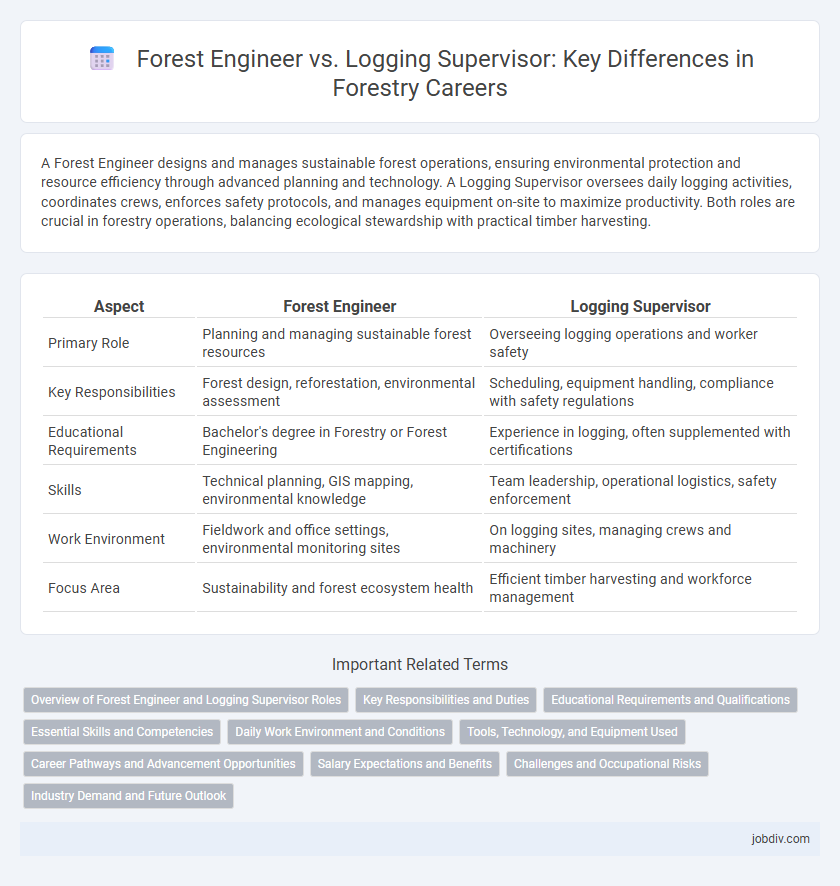A Forest Engineer designs and manages sustainable forest operations, ensuring environmental protection and resource efficiency through advanced planning and technology. A Logging Supervisor oversees daily logging activities, coordinates crews, enforces safety protocols, and manages equipment on-site to maximize productivity. Both roles are crucial in forestry operations, balancing ecological stewardship with practical timber harvesting.
Table of Comparison
| Aspect | Forest Engineer | Logging Supervisor |
|---|---|---|
| Primary Role | Planning and managing sustainable forest resources | Overseeing logging operations and worker safety |
| Key Responsibilities | Forest design, reforestation, environmental assessment | Scheduling, equipment handling, compliance with safety regulations |
| Educational Requirements | Bachelor's degree in Forestry or Forest Engineering | Experience in logging, often supplemented with certifications |
| Skills | Technical planning, GIS mapping, environmental knowledge | Team leadership, operational logistics, safety enforcement |
| Work Environment | Fieldwork and office settings, environmental monitoring sites | On logging sites, managing crews and machinery |
| Focus Area | Sustainability and forest ecosystem health | Efficient timber harvesting and workforce management |
Overview of Forest Engineer and Logging Supervisor Roles
Forest engineers specialize in designing and implementing sustainable forest management plans, utilizing expertise in soil science, hydrology, and environmental impact to optimize timber production while preserving ecosystem health. Logging supervisors manage daily logging operations, ensuring safety protocols, equipment maintenance, and efficient timber extraction align with regulatory standards. Both roles demand strong knowledge of forestry practices, but forest engineers emphasize planning and environmental assessment, whereas logging supervisors focus on operational oversight and workforce management.
Key Responsibilities and Duties
Forest Engineers design and implement sustainable forest management plans, focusing on land surveying, road construction, and erosion control to optimize timber production while preserving ecosystem health. Logging Supervisors manage on-site operations, overseeing crews to ensure safety compliance, efficient tree felling, and timber transport coordination. Both roles require expertise in environmental regulations, but Forest Engineers emphasize planning and technical assessments, whereas Logging Supervisors prioritize operational execution and workforce management.
Educational Requirements and Qualifications
Forest engineers typically require a bachelor's degree in forestry, environmental science, or natural resource management, emphasizing courses in forest ecology, soil science, and land surveying. Logging supervisors often have a high school diploma or associate degree combined with extensive field experience and certifications in safety and equipment operation. Both roles value strong knowledge of forest management principles, but forest engineers must demonstrate proficiency in technical planning and environmental regulations.
Essential Skills and Competencies
A Forest Engineer requires advanced knowledge in forest management, environmental science, and sustainable harvesting techniques, emphasizing skills in GIS mapping, soil analysis, and ecosystem restoration. A Logging Supervisor must excel in operational leadership, safety compliance, and workforce coordination, demonstrating strong abilities in equipment management, risk assessment, and logistics planning. Both roles necessitate effective communication and problem-solving skills but diverge in technical expertise and field operation focus.
Daily Work Environment and Conditions
Forest engineers primarily work in outdoor environments, conducting terrain analysis, designing access roads, and managing reforestation projects, often facing varying weather conditions and rugged landscapes. Logging supervisors oversee logging operations directly at harvest sites, managing crews and ensuring safety protocols are followed amid physically demanding and hazardous conditions. Both roles require extensive time in remote forest areas, but logging supervisors typically experience more immediate exposure to operational risks and fluctuating weather.
Tools, Technology, and Equipment Used
Forest engineers primarily utilize Geographic Information Systems (GIS), remote sensing technology, and computer-aided design (CAD) software to plan sustainable forest management and infrastructure development. Logging supervisors focus on coordinating heavy machinery such as feller bunchers, skidders, and chainsaws, while ensuring the use of safety equipment and adherence to operational protocols. Both roles require proficiency in modern tools, but forest engineers emphasize planning and analysis technology, whereas logging supervisors prioritize hands-on equipment management and operational oversight.
Career Pathways and Advancement Opportunities
Forest engineers often begin their careers with a degree in forestry or environmental engineering, focusing on sustainable forest management and ecological conservation, leading to opportunities in planning, design, and environmental impact analysis. Logging supervisors typically rise through experience in the field, managing timber harvesting operations and workforce coordination, with potential advancement into operations management or safety compliance roles. Both career paths offer progression into specialized sectors such as forest resource management, consulting, or regulatory positions, with forest engineers generally accessing higher-level technical and analytical roles.
Salary Expectations and Benefits
Forest Engineers typically earn between $60,000 and $90,000 annually, reflecting their technical expertise in forest management and environmental conservation. Logging Supervisors command salaries ranging from $50,000 to $80,000, with compensation influenced by on-site leadership responsibilities and operational efficiency. Benefits for both roles often include health insurance, retirement plans, and fieldwork allowances, though Forest Engineers may receive additional perks related to environmental compliance and project management.
Challenges and Occupational Risks
Forest Engineers face challenges related to designing sustainable forest management plans that balance ecological preservation with resource extraction, often encountering risks from heavy machinery and remote terrain navigation. Logging Supervisors must manage operational efficiency and worker safety in active logging sites, where occupational hazards include falling trees, equipment accidents, and exposure to harsh weather conditions. Both roles require strong risk assessment skills to mitigate workplace injuries and environmental impact while ensuring compliance with forestry regulations.
Industry Demand and Future Outlook
The demand for Forest Engineers is growing due to their expertise in sustainable forest management, environmental conservation, and resource planning, making them crucial for addressing climate change and regulatory compliance. Logging Supervisors remain essential for overseeing timber harvesting operations, ensuring safety, and meeting production targets, but their roles are increasingly influenced by automation and mechanized equipment. Future industry trends indicate stronger growth prospects for Forest Engineers as the forestry sector emphasizes ecological preservation and technological integration, while Logging Supervisors adapt to evolving operational technologies.
Forest Engineer vs Logging Supervisor Infographic

 jobdiv.com
jobdiv.com